No products in the cart.
NEWS
Your Guide to Successfully Growing Eggplants
Eggplants are a beloved addition to many gardens, prized for their unique texture, versatile flavor, and sometimes stunning appearance. While often seen as a plant that requires specific attention, cultivating healthy, productive eggplant bushes is well within reach for most gardeners. At Biogarden, we bring years of experience in nurturing plants from seed to harvest, and we’re here to share insights that can help you overcome challenges and celebrate abundant eggplant yields.
Growing eggplants starts with understanding their needs. These heat-loving members of the nightshade family thrive in warm conditions and require a relatively long growing season. Choosing the right spot in your garden – one that receives plenty of sunlight – is fundamental.
Exploring Diverse Eggplant Varieties
The image many people have of an eggplant is the large, dark purple Italian type. However, the world of eggplants is incredibly diverse, offering a range of shapes, sizes, and colors, each with slightly different flavors and culinary uses. Exploring these varieties can add excitement and new tastes to your kitchen.
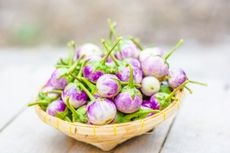 Basket filled with small, dark purple Indian eggplants
Basket filled with small, dark purple Indian eggplants
Beyond the standard globe shape, you’ll find slender, elongated Japanese or Thai eggplants, known for their thin skin and delicate flavor. Smaller, round varieties like Indian eggplants are popular in many cuisines. For something visually striking, consider varieties like the striped Calliope or the pale, almost ghost-like Casper heirloom. Other unique options include the attractive and delicious Beatrice. Selecting a variety that suits your climate and intended use is a key step.
 Two Whole Japanese Eggplants Next To Slices Of Japanese Eggplants
Two Whole Japanese Eggplants Next To Slices Of Japanese Eggplants
There are many common types of eggplant, each bringing something different to the table, proving that this vegetable is far from one-dimensional.
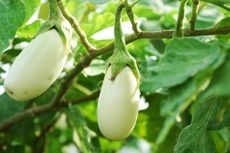 Various white colored eggplants on display
Various white colored eggplants on display
Essential Care Practices for Healthy Eggplant Growth
Providing consistent and appropriate care is crucial for maximizing your eggplant harvest and preventing common issues.
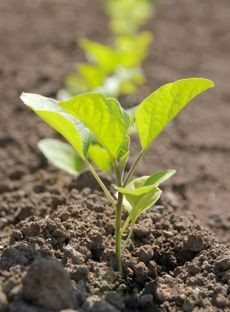 Row of young eggplant seedlings spaced in garden soil
Row of young eggplant seedlings spaced in garden soil
Proper Spacing: Giving eggplant seedlings adequate space when planting is essential. Sufficient distance between plants ensures good air circulation, which helps reduce the risk of fungal diseases. It also allows the root systems to develop properly, supporting healthy growth and fruit production.
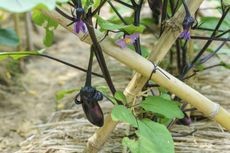 Eggplant plant supported by bamboo stakes
Eggplant plant supported by bamboo stakes
Providing Support: As eggplant plants mature and begin to set fruit, they can become quite heavy. Supporting eggplants with stakes, cages, or other structures is imperative to prevent branches from breaking under the weight of developing fruit. Support also keeps the fruit off the soil, minimizing pest and disease problems.
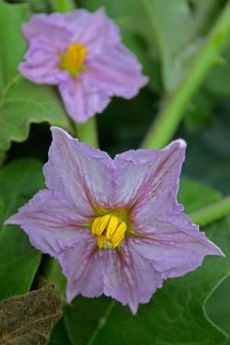 Bright purple eggplant flowers ready for pollination
Bright purple eggplant flowers ready for pollination
Pollination: Eggplant blossoms need to be pollinated to develop into fruit. While insects and wind often handle this naturally, sometimes conditions aren’t ideal. Understanding how to hand pollinate eggplant flowers can significantly improve fruit set, especially in protected environments like greenhouses or during periods of poor weather.
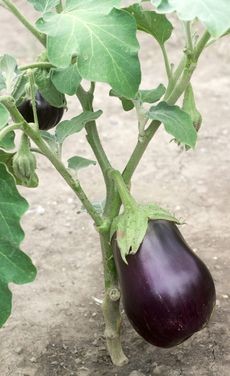 Single purple eggplant growing on a leafy plant
Single purple eggplant growing on a leafy plant
Pruning: While not always strictly necessary, strategic pruning can be beneficial. Removing some leaves or stems can improve air circulation and direct the plant’s energy towards developing fewer, but larger and healthier, fruits. This is particularly helpful for established or older plants.
Addressing Common Eggplant Growing Problems
Even with the best care, gardeners may encounter issues. Knowing what to look for and how to respond can save your harvest.
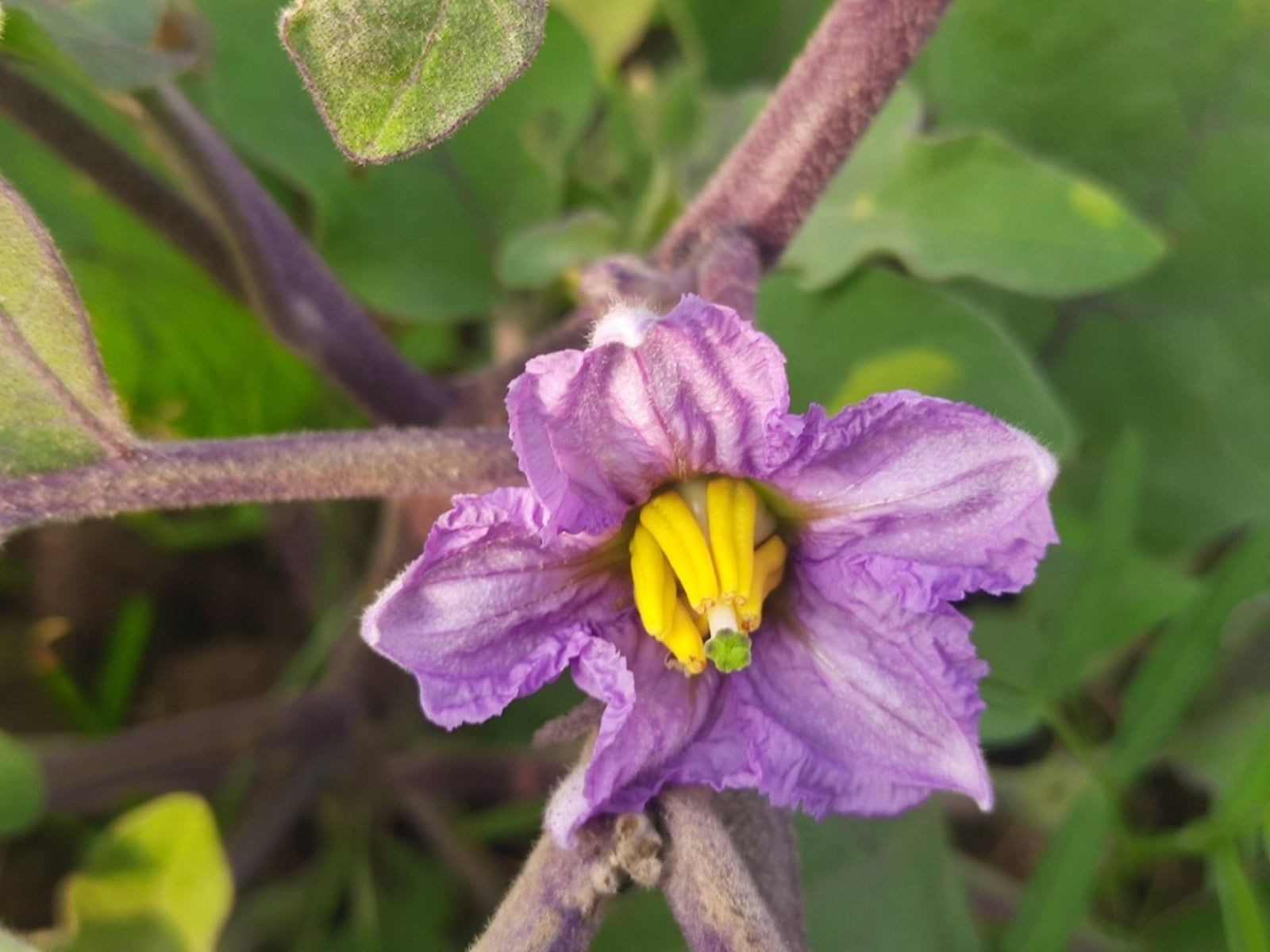 Close-up of a vibrant purple eggplant flower
Close-up of a vibrant purple eggplant flower
Eggplant Blossoms Drying Out and Falling Off: Seeing flowers drop without setting fruit is a common frustration. This often indicates environmental stress, such as fluctuating temperatures, inconsistent watering, or poor pollination. Ensuring consistent moisture and warmth can help prevent this.
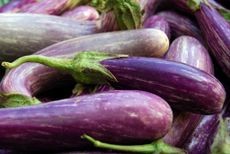 Pile of ripe purple eggplants, checking for seediness
Pile of ripe purple eggplants, checking for seediness
Seedy Eggplants: Cutting into an eggplant only to find it full of large, hard, bitter seeds is disappointing. This typically happens when the fruit is allowed to overripen on the plant. Harvesting eggplants when they are still slightly immature, before the seeds fully develop, is the best way to avoid seedy fruit.
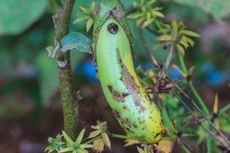 Eggplant fruit showing symptoms of Colletotrichum rot infection
Eggplant fruit showing symptoms of Colletotrichum rot infection
Diseases: Eggplants are susceptible to various fungal diseases. These include Colletotrichum Fruit Rot, which causes rotting on the fruit, Early Blight (Alternaria), visible as leaf spots that can spread and reduce yield, and Phomopsis Blight, affecting leaves, stems, and fruit with spots and rot. Identifying symptoms early is key to managing these diseases. Crop rotation, good sanitation (removing infected debris), and ensuring proper plant spacing for airflow are important preventive measures.
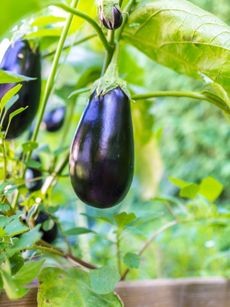 Eggplant leaf showing symptoms of Early Blight (Alternaria)
Eggplant leaf showing symptoms of Early Blight (Alternaria)
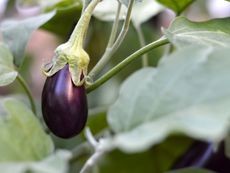 Diseased eggplant fruit showing signs of Phomopsis Blight rot
Diseased eggplant fruit showing signs of Phomopsis Blight rot
Exploring Different Cultivation Methods
For those who enjoy experimenting, eggplants offer a few alternative growing methods.
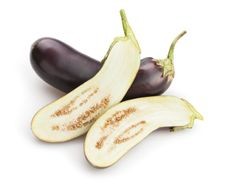 Whole and halved eggplant illustrating seed saving potential
Whole and halved eggplant illustrating seed saving potential
Saving Eggplant Seeds: If you’re growing open-pollinated or heirloom eggplant varieties, saving seeds can be a rewarding way to preserve genetic traits and ensure a supply for future seasons. It requires selecting mature, healthy fruit specifically for seed collection.
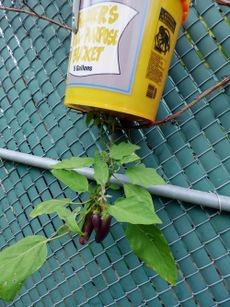 Eggplant plant growing upside down from a container
Eggplant plant growing upside down from a container
Growing Eggplants Upside Down: Similar to tomatoes, eggplants can be successfully grown upside down in specialized hanging containers. This method can save space and minimize certain soil-borne pest and disease issues.
Conclusion
Growing eggplants can be a rewarding experience, bringing beautiful and delicious fruits to your table. By selecting suitable varieties, providing consistent care including adequate spacing and support, understanding the nuances of pollination, and being prepared to address common issues like blossom drop, seedy fruit, and diseases, you can significantly increase your chances of a successful harvest.
At Biogarden, we are committed to supporting your gardening journey with expert knowledge and quality products designed to help your plants thrive. Embrace the process, learn from your plants, and enjoy the satisfaction of harvesting your own delicious eggplants.



